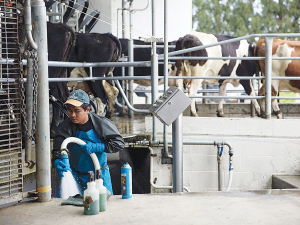DairyNZ Calls for Changes to Government’s Proposed Resource Management Act Reform
DairyNZ says the Government’s proposed Resource Management Act reform needs further work to ensure it delivers on its intent.
 DairyNZ says the Government’s decision to allow 300 more international dairy farm workers into New Zealand doesn’t do enough to help resolve the sector’s significant staff shortage.
DairyNZ says the Government’s decision to allow 300 more international dairy farm workers into New Zealand doesn’t do enough to help resolve the sector’s significant staff shortage.
DairyNZ says the Government’s decision to allow 300 more international dairy farm workers into New Zealand doesn’t do enough to help resolve the sector’s significant staff shortage.
In November, the dairy sector requested the Government allow 1500 dairy workers into New Zealand in 2022, but only 300 spots have been granted, in a decision communicated to industry last week.
DairyNZ chief executive Dr Tim Mackle says the Government’s decision will be a bitter disappointment for many under-pressure dairy farmers who are anxiously facing yet another season critically short-staffed.
“This is a wellbeing issue, in terms of mental wellbeing but also health and safety on farm. Understaffing increases the risk of accidents and can put animal welfare at risk. Dairy farmers are working long hours to keep their farms going, but it just isn’t sustainable,” says Mackle.
He says DairyNZ will continue to advocate for more international workers.
“We have really appreciated the continued support of Minister O’Connor and also MPI who have advocated on this important issue for almost two years – but it would seem some of their colleagues in Government just aren’t listening and farmers are frustrated by that.
“Although 300 workers will help a small number of farmers, it’s a drop in the bucket for New Zealand’s largest export sector which is at least 4000 workers short.
"This issue won't just affect the dairy sector - we all access the same domestic talent pool, whether that's between primary sectors or from support industries like rural contracting and trucking companies. The decision will have a knock-on effect on many other sectors."
Mackle says farmers who want farm assistants on board for calving are encouraged to apply now for one of the 300 spaces, as there is no guarantee another opportunity to recruit international workers before calving will be possible.
“With workers no longer required to isolate or stay in MIQ and no cap on the number of farm assistants within that 300, we expect stronger interest from farmers using the class exception pathway.”
He says many farmers will struggle to get through the busy calving season without enough people on-farm.
Recent data indicates the dairy sector is now short of up to 4000 workers. Staff shortages have been exacerbated by the border closure and some international workers leaving New Zealand.
Mackle says the current record low unemployment rate is affecting all sectors’ ability to recruit Kiwis, including dairy.
Budou are being picked now in Bridge Pā, the most intense and exciting time of the year for the Greencollar team – and the harvest of the finest eating grapes is weeks earlier than expected.
The Real Estate Institute of New Zealand (REINZ) has released its latest rural property report, providing a detailed view of New Zealand’s rural real estate market for the 12 months ending December 2025.
Rural retailer Farmlands has released it's latest round of half-year results, labeling it as evidence that its five-year strategy is delivering on financial performance and better value for members.
OPINION: "We are back to where we were a year ago," according to a leading banking analyst in the UK, referring to US president Donald Trump's latest imposition of a global 10% tariff on all exports into the US.
DairyNZ says the Government’s proposed Resource Management Act reform needs further work to ensure it delivers on its intent.
Overseas Trade Minister Todd McClay says he's working constructively with the Labour Party in the hope they will endorse the free trade agreement (FTA) with India when the agreement comes before Parliament for ratification.
OPINION: Expect the Indian free trade deal to feature strongly in the election campaign.
OPINION: One of the world's largest ice cream makers, Nestlé, is going cold on the viability of making the dessert.